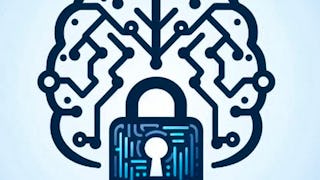Filter by
SubjectRequired
LanguageRequired
The language used throughout the course, in both instruction and assessments.
Learning ProductRequired
LevelRequired
DurationRequired
SkillsRequired
SubtitlesRequired
EducatorRequired
Explore the Fraud Course Catalog
 Status: Free
Status: FreeWest Virginia University
Skills you'll gain: Auditing, Loss Prevention, Internal Controls, Financial Controls, Threat Detection, Anomaly Detection, Financial Auditing, Cybersecurity, Financial Data, Cyber Operations, Investigation, Criminal Investigation and Forensics, Analytics, Specialized Accounting, Cyber Attacks, Security Awareness, Big Data, Accounting, Business Ethics, Compliance Reporting
 Status: NewStatus: Free
Status: NewStatus: FreeCoursera Instructor Network
Skills you'll gain: Generative AI, Law, Regulation, and Compliance, Regulatory Requirements, Compliance Management, Compliance Reporting, Governance, Business Risk Management, Governance Risk Management and Compliance, Risk Management, Financial Regulation, Anomaly Detection, Compliance Auditing, Data Governance, Artificial Intelligence, Large Language Modeling, Threat Detection, Advanced Analytics

Skills you'll gain: Generative AI, Data Ethics, Anomaly Detection, Personally Identifiable Information, Advanced Analytics, Threat Detection, Artificial Intelligence, Regulatory Compliance, Deep Learning, Data Security, Applied Machine Learning, Information Privacy, Natural Language Processing
 Status: New AI skills
Status: New AI skillsGoogle
Skills you'll gain: Threat Modeling, Network Security, Threat Management, Incident Response, Vulnerability Management, Computer Security Incident Management, Hardening, Intrusion Detection and Prevention, Cyber Threat Intelligence, Cyber Attacks, Cybersecurity, Network Protocols, Cloud Security, Vulnerability Assessments, Threat Detection, Bash (Scripting Language), Operating Systems, Security Controls, Debugging, Python Programming

Skills you'll gain: Feature Engineering, Big Data, Anomaly Detection, Google Cloud Platform, Unsupervised Learning, Data Manipulation, Applied Machine Learning, Decision Tree Learning, Machine Learning Methods, Risk Modeling, Threat Detection, Supervised Learning, Advanced Analytics, Predictive Modeling, Predictive Analytics, Transaction Processing

Johns Hopkins University
Skills you'll gain: Anomaly Detection, Generative AI, Intrusion Detection and Prevention, Malware Protection, Continuous Monitoring, Cybersecurity, Threat Detection, Cyber Threat Intelligence, Feature Engineering, Network Analysis, Cyber Attacks, Email Security, System Design and Implementation, Network Security, Artificial Intelligence and Machine Learning (AI/ML), Threat Modeling, Jupyter, Authentications, Deep Learning, Machine Learning Software

University of Pennsylvania
Skills you'll gain: Compliance Management, Law, Regulation, and Compliance, Legal Risk, Business Ethics, Internal Controls, Risk Analysis, Risk Mitigation, Ethical Standards And Conduct, Due Diligence, Employee Training

University of Pennsylvania
Skills you'll gain: Business Ethics, Risk Control, Compliance Management, Governance, Ethical Standards And Conduct, Business Risk Management, Policy Analysis, Legal Risk, Socioeconomics, Behavioral Economics, Social Sciences, Decision Making, Analysis, Economics, Political Sciences, Psychology, Economic Development, Regulation and Legal Compliance, Business Economics

Coursera Project Network
Skills you'll gain: Generative AI, Keras (Neural Network Library), Tensorflow, Deep Learning, Dimensionality Reduction, Applied Machine Learning, Anomaly Detection, Data Processing, Data Visualization, Data Synthesis
 Status: NewStatus: Free
Status: NewStatus: FreeCoursera Instructor Network
Skills you'll gain: Anomaly Detection, Data Visualization, Data Presentation, Generative AI, Risk Management, Business Risk Management, ChatGPT, Data Synthesis, Compliance Management, Compliance Auditing, Regulatory Compliance, Threat Detection, Prompt Engineering, Data Pipelines, Applied Machine Learning, Automation, Predictive Analytics, Artificial Intelligence

University of Illinois Urbana-Champaign
Skills you'll gain: Balance Sheet, Revenue Recognition, Financial Accounting, Financial Reporting, Depreciation, Financial Statement Analysis, Generally Accepted Accounting Principles (GAAP), Accounts Receivable, Accounting, Inventory Accounting, Income Statement, Financial Statements, Cash Management, Accrual Accounting, Tax Management, Cash Flows, Fixed Asset, Asset Management, International Financial Reporting Standards, Standard Accounting Practices

University of Colorado System
Skills you'll gain: Data Encryption Standard, Public Key Infrastructure, Cryptography, Cybersecurity, Public Key Cryptography Standards (PKCS), Key Management, Advanced Encryption Standard (AES), Encryption, Authentications, Arithmetic, Algorithms, Applied Mathematics, Data Integrity, Probability, Computer Science
Fraud learners also search
In summary, here are 10 of our most popular fraud courses
- Forensic Accounting and Fraud Examination: West Virginia University
- GenAI for Fraud Detection and Compliance: Coursera Instructor Network
- Gen AI for Fraud Detection Analytics: Edureka
- Google Cybersecurity: Google
- Fraud Detection on Financial Transactions with Machine Learning on Google Cloud: Google Cloud
- AI for Cybersecurity: Johns Hopkins University
- What is Corruption: Anti-Corruption and Compliance: University of Pennsylvania
- Corruption: University of Pennsylvania
- Data Balancing with Gen AI: Credit Card Fraud Detection: Coursera Project Network
- GenAI for Fraud Analysts: Improving Detection Efficiency: Coursera Instructor Network










